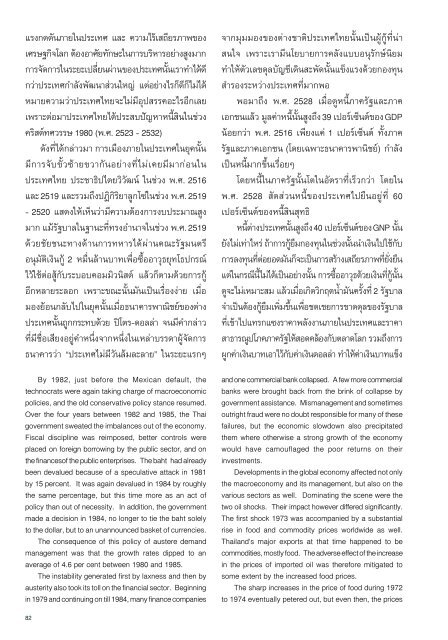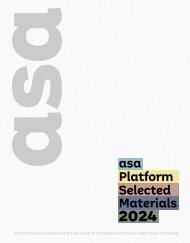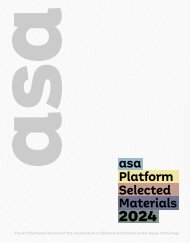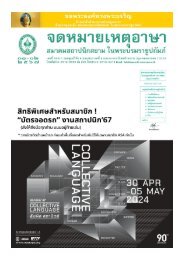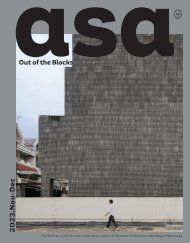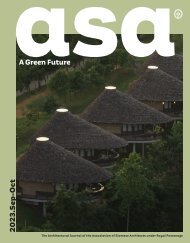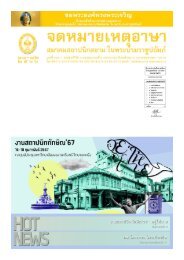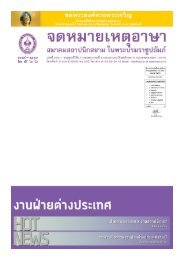บ้านเรือนถิ่นไทยในช่วงเจ็ดทศวรรษ 2489-2559
Create successful ePaper yourself
Turn your PDF publications into a flip-book with our unique Google optimized e-Paper software.
แรงกดดันภายในประเทศ และ ความไร้เสถียรภาพของ<br />
เศรษฐกิจโลก ต้องอาศัยทักษะในการบริหารอย่างสูงมาก<br />
การจัดการในระยะเปลี่ยนผ่านของประเทศนั้นเราท ำได้ดี<br />
กว่าประเทศกำลังพัฒนาส่วนใหญ่ แต่อย่างไรก็ดีก็ไม่ได้<br />
หมายความว่าประเทศไทยจะไม่มีอุปสรรคอะไรอีกเลย<br />
เพราะต่อมาประเทศไทยได้ประสบปัญหาหนี้สินในช่วง<br />
คริสต์ทศวรรษ 1980 (พ.ศ. 2523 - 2532)<br />
ดังที่ได้กล่าวมา การเมืองภายในประเทศในยุคนั้น<br />
มีการจับขั้วซ้ายขวากันอย่างที่ไม่เคยมีมาก่อนใน<br />
ประเทศไทย ประชาธิปไตยวิวัฒน์ ในช่วง พ.ศ. 2516<br />
และ 2519 และรวมถึงปฏิกิริยาลูกโซ่ในช่วง พ.ศ. 2519<br />
- 2520 แสดงให้เห็นว่ามีความต้องการงบประมาณสูง<br />
มาก แม้รัฐบาลในฐานะที่ทรงอำนาจในช่วง พ.ศ. 2519<br />
ด้วยชัยชนะทางด้านการทหารได้ผ่านคณะรัฐมนตรี<br />
อนุมัติเงินกู้ 2 หมื่นล้านบาทเพื่อซื้ออาวุธยุทโธปกรณ์<br />
ไว้ใช้ต่อสู้กับระบอบคอมมิวนิสต์ แล้วก็ตามด้วยการกู้<br />
อีกหลายระลอก เพราะขณะนั้นมันเป็นเรื่องง่าย เมื่อ<br />
มองย้อนกลับไปในยุคนั้นเมื่อธนาคารพาณิชย์ของต่าง<br />
ประเทศนั้นถูกกระทบด้วย ปิโตร-ดอลล่า จนมีคำกล่าว<br />
ที่มีชื ่อเสียงอยู่คำหนึ่งจากหนึ ่งในเหล่าบรรดาผู้จัดการ<br />
ธนาคารว่า “ประเทศไม่มีวันล้มละลาย” ในระยะแรกๆ<br />
By 1982, just before the Mexican default, the<br />
technocrats were again taking charge of macroeconomic<br />
policies, and the old conservative policy stance resumed.<br />
Over the four years between 1982 and 1985, the Thai<br />
government sweated the imbalances out of the economy.<br />
Fiscal discipline was reimposed, better controls were<br />
placed on foreign borrowing by the public sector, and on<br />
the financesof the public enterprises. The baht had already<br />
been devalued because of a speculative attack in 1981<br />
by 15 percent. It was again devalued in 1984 by roughly<br />
the same percentage, but this time more as an act of<br />
policy than out of necessity. In addition, the government<br />
made a decision in 1984, no longer to tie the baht solely<br />
to the dollar, but to an unannounced basket of currencies.<br />
The consequence of this policy of austere demand<br />
management was that the growth rates dipped to an<br />
average of 4.6 per cent between 1980 and 1985.<br />
The instability generated first by laxness and then by<br />
austerity also took its toll on the financial sector. Beginning<br />
in 1979 and continuing on till 1984, many finance companies<br />
82<br />
จากมุมมองของต่างชาติประเทศไทยนั้นเป็นผู้กู้ที่น่า<br />
สนใจ เพราะเรามีนโยบายการคลังแบบอนุรักษ์นิยม<br />
ทำให้ตัวเลขดุลบัญชีเดินสะพัดนั้นแข็งแรงด้วยกองทุน<br />
สำรองระหว่างประเทศที่มากพอ<br />
พอมาถึง พ.ศ. 2528 เมื่อดูหนี้ภาครัฐและภาค<br />
เอกชนแล้ว มูลค่าหนี้นั้นสูงถึง 39 เปอร์เซ็นต์ของ GDP<br />
น้อยกว่า พ.ศ. 2516 เพียงแค่ 1 เปอร์เซ็นต์ ทั้งภาค<br />
รัฐและภาคเอกชน (โดยเฉพาะธนาคารพานิชย์) กำลัง<br />
เป็นหนี้มากขึ้นเรื่อยๆ<br />
โดยหนี้ในภาครัฐนั้นโตในอัตราที่เร็วกว่า โดยใน<br />
พ.ศ. 2528 สัดส่วนหนี้ของประเทศไปยืนอยู่ที่ 60<br />
เปอร์เซ็นต์ของหนี้สินสุทธิ<br />
หนี้ต่างประเทศนั้นสูงถึง 40 เปอร์เซ็นต์ของ GNP นั้น<br />
ยังไม่เท่าไหร่ ถ้าการกู้ยืมกองทุนในช่วงนั้นน ำเงินไปใช้กับ<br />
การลงทุนที่ต่อยอดมันก็จะเป็นการสร้างเสถียรภาพที่ยั่งยืน<br />
แต่ในกรณีนี้ไม่ได้เป็นอย่างนั้น การซื้ออาวุธด้วยเงินที่กู้นั้น<br />
ดูจะไม่เหมาะสม แล้วเมื่อเกิดวิกฤตน้ ำมันครั้งที่ 2 รัฐบาล<br />
จำเป็นต้องกู้ยืมเพิ่มขึ้นเพื่อชดเชยการขาดดุลของรัฐบาล<br />
ที่เข้าไปแทรกแซงราคาพลังงานภายในประเทศและราคา<br />
สาธารณูปโภคภาครัฐให้สอดคล้องกับตลาดโลก รวมถึงการ<br />
ผูกค่าเงินบาทเอาไว้กับค่าเงินดอลล่า ท ำให้ค่าเงินบาทแข็ง<br />
and one commercial bank collapsed. A few more commercial<br />
banks were brought back from the brink of collapse by<br />
government assistance. Mismanagement and sometimes<br />
outright fraud were no doubt responsible for many of these<br />
failures, but the economic slowdown also precipitated<br />
them where otherwise a strong growth of the economy<br />
would have camouflaged the poor returns on their<br />
investments.<br />
Developments in the global economy affected not only<br />
the macroeconomy and its management, but also on the<br />
various sectors as well. Dominating the scene were the<br />
two oil shocks. Their impact however differed significantly.<br />
The first shock 1973 was accompanied by a substantial<br />
rise in food and commodity prices worldwide as well.<br />
Thailand’s major exports at that time happened to be<br />
commodities, mostly food. The adverse effect of the increase<br />
in the prices of imported oil was therefore mitigated to<br />
some extent by the increased food prices.<br />
The sharp increases in the price of food during 1972<br />
to 1974 eventually petered out, but even then, the prices


